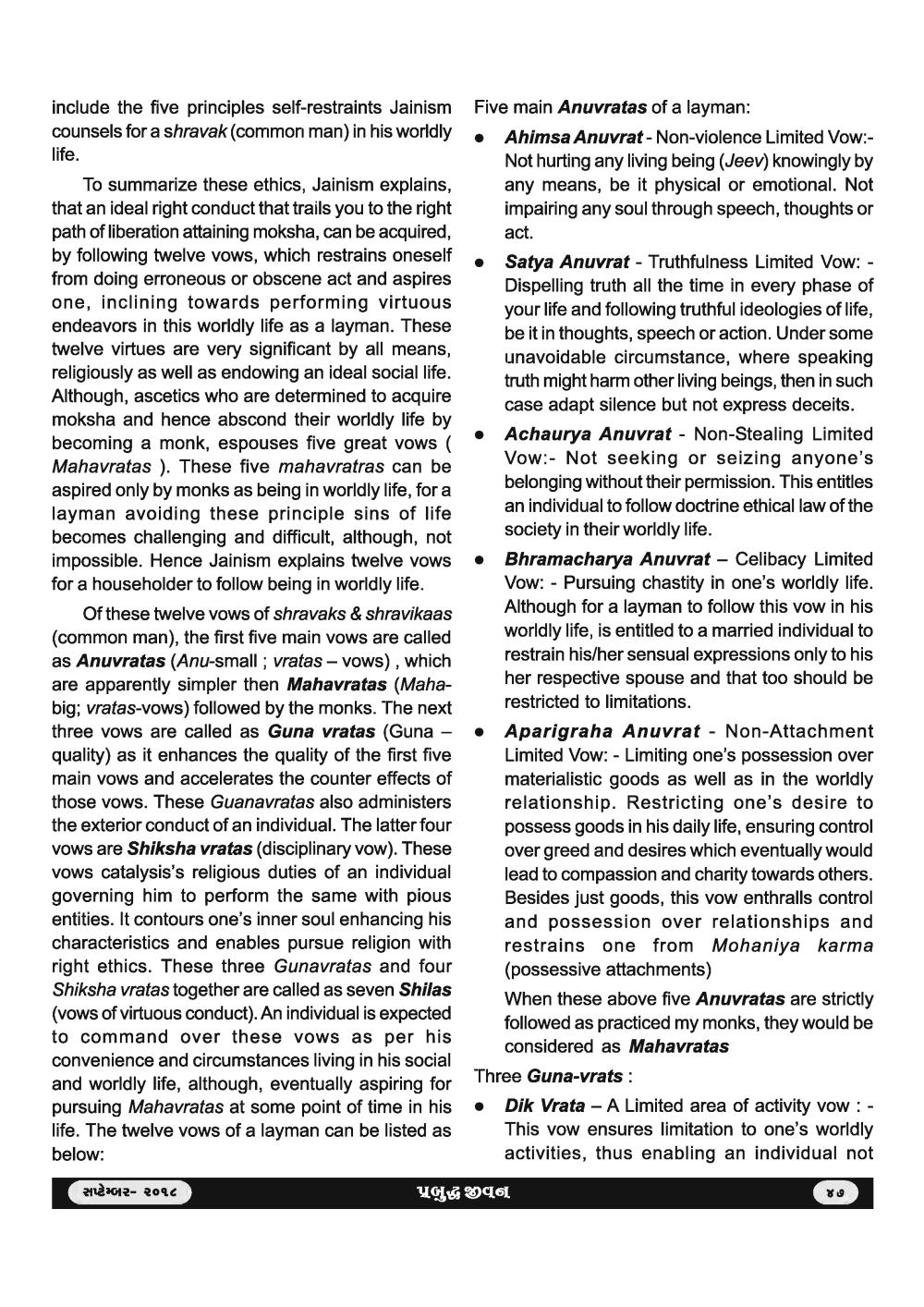________________
include the five principles self-restraints Jainism counsels for a shravak (common man) in his worldly life.
To summarize these ethics, Jainism explains, that an ideal right conduct that trails you to the right path of liberation attaining moksha, can be acquired, by following twelve vows, which restrains oneself from doing erroneous or obscene act and aspires one, inclining towards performing virtuous endeavors in this worldly life as a layman. These twelve virtues are very significant by all means, religiously as well as endowing an ideal social life. Although, ascetics who are determined to acquire moksha and hence abscond their worldly life by becoming a monk, espouses five great vows ( Mahavratas ). These five mahavratras can be aspired only by monks as being in worldly life, for a layman avoiding these principle sins of life becomes challenging and difficult, although, not impossible. Hence Jainism explains twelve vows for a householder to follow being in worldly life.
Of these twelve vows of shravaks & shravikaas (common man), the first five main vows are called as Anuvratas (Anu-small; vratas -vows), which are apparently simpler then Mahavratas (Mahabig; vratas-vows) followed by the monks. The next three vows are called as Guna vratas (Guna - quality) as it enhances the quality of the first five main vows and accelerates the counter effects of those vows. These Guanavratas also administers the exterior conduct of an individual. The latter four vows are Shiksha vratas (disciplinary vow). These vows catalysis's religious duties of an individual governing him to perform the same with pious entities. It contours one's inner soul enhancing his characteristics and enables pursue religion with right ethics. These three Gunavratas and four Shiksha vratas together are called as seven Shilas (vows of virtuous conduct). An individual is expected to command over these vows as per his convenience and circumstances living in his social and worldly life, although, eventually aspiring for pursuing Mahavratas at some point of time in his life. The twelve vows of a layman can be listed as below:
Five main Anuvratas of a layman: . Ahimsa Anuvrat - Non-violence Limited Vow:
Not hurting any living being (Jeev) knowingly by any means, be it physical or emotional. Not impairing any soul through speech, thoughts or act. Satya Anuvrat - Truthfulness Limited Vow:Dispelling truth all the time in every phase of your life and following truthful ideologies of life, be it in thoughts, speech or action. Under some unavoidable circumstance, where speaking truth might harm other living beings, then in such case adapt silence but not express deceits. Achaurya Anuvrat - Non-Stealing Limited Vow:- Not seeking or seizing anyone's belonging without their permission. This entitles an individual to follow doctrine ethical law of the society in their worldly life. Bhramacharya Anuvrat - Celibacy Limited Vow: - Pursuing chastity in one's worldly life. Although for a layman to follow this vow in his worldly life, is entitled to a married individual to restrain his/her sensual expressions only to his her respective spouse and that too should be restricted to limitations. Aparigraha Anuvrat - Non-Attachment Limited Vow: - Limiting one's possession over materialistic goods as well as in the worldly relationship. Restricting one's desire to possess goods in his daily life, ensuring control over greed and desires which eventually would lead to compassion and charity towards others. Besides just goods, this vow enthralls control and possession over relationships and restrains one from Mohaniya karma (possessive attachments) When these above five Anuvratas are strictly followed as practiced my monks, they would be
considered as Mahavratas Three Guna-vrats :
Dik Vrata - A Limited area of activity vow : - This vow ensures limitation to one's worldly activities, thus enabling an individual not
સપ્ટેમ્બર- ૨૦૧૮
UGOO.




